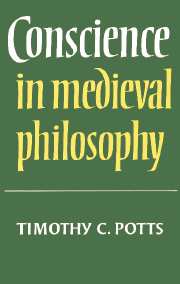Book contents
- Frontmatter
- Contents
- Preface
- Glossary
- 1 Peter Lombard and Jerome
- 2 Philip the Chancellor
- 3 Bonaventure
- 4 Aquinas
- 5 Balance-sheet
- TRANSLATIONS
- Notes on the translations
- Jerome, Commentary on Ezekiel 1.7
- Augustine, On the Trinity, book 12 (excerpts)
- Peter Lombard, Books of Judgements 2.39
- Philip the Chancellor, Summa de bono, treatise on conscience
- Bonaventure, Commentary on Peter Lombard's Books of ‘Judgements’ 2.39
- Aquinas, Debated Questions on Truth 16–17
- APPENDICES
- Bibliography
- Analytical index of subjects
- Index of proper names
- Index of Biblical references
Jerome, Commentary on Ezekiel 1.7
Published online by Cambridge University Press: 06 January 2010
- Frontmatter
- Contents
- Preface
- Glossary
- 1 Peter Lombard and Jerome
- 2 Philip the Chancellor
- 3 Bonaventure
- 4 Aquinas
- 5 Balance-sheet
- TRANSLATIONS
- Notes on the translations
- Jerome, Commentary on Ezekiel 1.7
- Augustine, On the Trinity, book 12 (excerpts)
- Peter Lombard, Books of Judgements 2.39
- Philip the Chancellor, Summa de bono, treatise on conscience
- Bonaventure, Commentary on Peter Lombard's Books of ‘Judgements’ 2.39
- Aquinas, Debated Questions on Truth 16–17
- APPENDICES
- Bibliography
- Analytical index of subjects
- Index of proper names
- Index of Biblical references
Summary
Born in north-east Yugoslavia to wealthy Christian parents, Jerome was sent to Rome when about 12 for his education, in the course of which he became addicted to the Greek and Latin classics and learned to write extremely good Latin. After a strenuous social life, he was baptised about 365 and decided, to the disappointment of his family, to become a monk. About 374 he joined the hermits in the Syrian desert behind Antioch, taking the opportunity to learn Hebrew. In 382 he returned to Rome to become secretary to Pope Damasus and played a central part in the campaign for imposing celibacy upon priests. The next pope did not much like him, so he returned to the east with two Roman ladies and founded a monastery in Bethlehem, where he devoted the rest of his life to scholarship. He is best known for his Latin translation of the Bible, the Vulgate, but in his day was a great satirist and controversialist, which made him many enemies.
COMMENTARY ON EZEKIEL, 1.7
(Latin text in Migne, Patrologia Latina, vol. 25, col. 22)
Most people interpret the man, the lion and the ox as the rational, emotional and appetitive parts of the soul, following Plato's division, who calls them the logikon and thymikon and epithymetikon, locating reason in the brain, emotion in the gall-bladder and appetite in the liver.
- Type
- Chapter
- Information
- Conscience in Medieval Philosophy , pp. 79 - 80Publisher: Cambridge University PressPrint publication year: 1980
- 1
- Cited by



